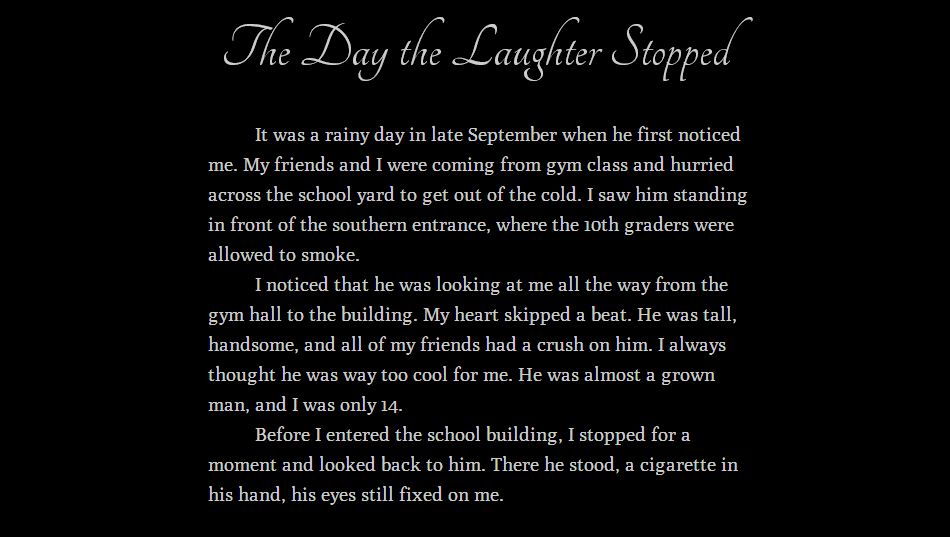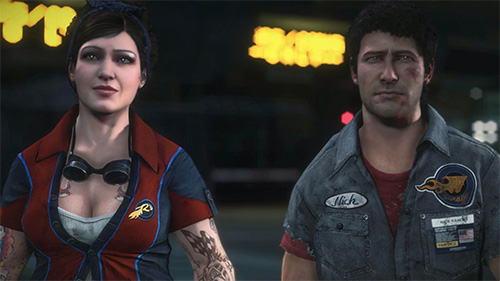Divinity: Original Sin promises to give players the “freedom of a pen and paper RPG” in a video game. As any one who’s spent any amount of time playing pen and paper RPGs will tell you, that’s a pretty bold claim. So, does Divinity deliver on this promise? Personally, I’m not sure it’s really possible for a video game to give you the same openness you’d get from the classic D&D-style games. Divinity certainly tries, but it may be reaching a bit too far.
Before getting to the review, I want to start with a story of one of the first games I ran as a Dungeon Master in D&D 3rd edition. Looking for something more interesting to throw at my level 1 party than your run-of-the-mill kobold attack, I wrote a story about an elderly woman who suddenly discovered that she had sorcery abilities. Tragically, the discovery caused her to accidentally kill all of her cats with her new-found pow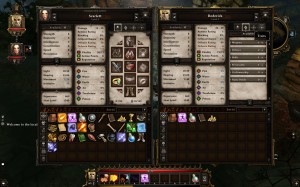 ers. She then turned to necromancy and raised all of her cats as zombies. As my players explored the ruined fort she had taken over (with her horde of zombie cats), one of the zombies jumped out of a dresser to attack. Our rogue, with remarkably high dexterity and reflex abilities, decided that he would throw his torch and the zombie cat back in the dresser, and attempt to hold it closed. Well, with a series of great rolls and some luck, he managed to do just that. It wasn’t at all how I had intended for the fight to go, but it was awesome and totally memorable.
ers. She then turned to necromancy and raised all of her cats as zombies. As my players explored the ruined fort she had taken over (with her horde of zombie cats), one of the zombies jumped out of a dresser to attack. Our rogue, with remarkably high dexterity and reflex abilities, decided that he would throw his torch and the zombie cat back in the dresser, and attempt to hold it closed. Well, with a series of great rolls and some luck, he managed to do just that. It wasn’t at all how I had intended for the fight to go, but it was awesome and totally memorable.
Why am I telling you a story about D&D in my Divinity review? Well, that’s precisely the kind of openness I think of when I hear the phrase “freedom of a pen and paper RPG”. The ability to think creatively and flexibly in response to any situation. In my hour of playing Divinity, I never once threw a zombie cat into a dresser (metaphorically speaking). Of course, that might not be a fair critique—I can’t even imagine how a game system could possibly anticipate and respond to all of the crazy things players could think of to do. Heck, part of the fun of being a dungeon master in the first place is hearing and responding to the crazy things your players think up (you want to do what with what? Uhhh…. make a … dexterity check?!?).
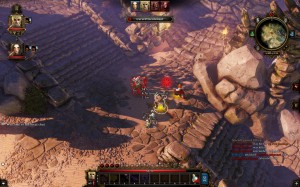 But while Divinity can’t quite hit the bar of non-digital RPGs in terms of the “zombie-cat-dresser test”, it does feel strongly reminiscent of classic D&D in terms of combat and character stats. The basic stats, including Strength, Intelligence, and the others, are all there, and you have skills and talents you increase as you level up. There’s not a whole lot of introduction to the various classes, but as a longtime RPG player I was able to choose cleric and make some fairly solid guesses about how to build her based on classic tropes. Combat is turn-based, uses an initiative system based on perception and other skills, and proceeds using action points. On your turn you have a certain number of action points you can spend- taking a single step or two might only take up one action point, whereas moving a larger distance could take all of your action points. The various skills, spells, scrolls and other possible moves all take varying amounts of action points, meaning that on each turn you really have to think about what balance of actions you’ll take. You can also save up your action points by holding for a turn, and any unspent action points will roll over to your next turn. This is a nice way of balancing some of the complexity that classic D&D gets bogged down in (move actions, full actions, free actions, and so on).
But while Divinity can’t quite hit the bar of non-digital RPGs in terms of the “zombie-cat-dresser test”, it does feel strongly reminiscent of classic D&D in terms of combat and character stats. The basic stats, including Strength, Intelligence, and the others, are all there, and you have skills and talents you increase as you level up. There’s not a whole lot of introduction to the various classes, but as a longtime RPG player I was able to choose cleric and make some fairly solid guesses about how to build her based on classic tropes. Combat is turn-based, uses an initiative system based on perception and other skills, and proceeds using action points. On your turn you have a certain number of action points you can spend- taking a single step or two might only take up one action point, whereas moving a larger distance could take all of your action points. The various skills, spells, scrolls and other possible moves all take varying amounts of action points, meaning that on each turn you really have to think about what balance of actions you’ll take. You can also save up your action points by holding for a turn, and any unspent action points will roll over to your next turn. This is a nice way of balancing some of the complexity that classic D&D gets bogged down in (move actions, full actions, free actions, and so on).
However, while the game gets a check plus in character stats and combat, it gets another check minus in terms of avatar appearance. The customization options are extremely limited; I don’t need Bethesda-style options (how near/far do you want your nose to be from your upper lip), but your customization options in Divinity are limited to a paltry n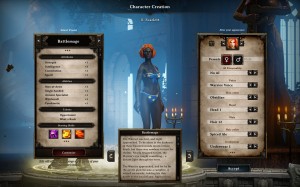 umber of options in a small number of categories: face-paint/makeup, skin color, hair style, and hair color. Bizarrely, one of the customization options is underwear, and you can select from a blue with yellow stars set or one of two maroon sets. So, we couldn’t have height/weight/body type customization, or even some better skin tones/more diverse facial features, but I can choose my underwear? Great. Given the fairly limited number of options, I still felt like I was playing a stock character in an adventure game, as opposed to my character in a role-playing game.
umber of options in a small number of categories: face-paint/makeup, skin color, hair style, and hair color. Bizarrely, one of the customization options is underwear, and you can select from a blue with yellow stars set or one of two maroon sets. So, we couldn’t have height/weight/body type customization, or even some better skin tones/more diverse facial features, but I can choose my underwear? Great. Given the fairly limited number of options, I still felt like I was playing a stock character in an adventure game, as opposed to my character in a role-playing game.
The above complaints aside, I had an enjoyable time with my hour or so in Divinity. The game has online co-op, and my husband and I had a pretty good time running around and smashing orcs together. There are several interesting conversation points where one party member gets to lead the interaction, and then the other responds- in one such event I commiserated with a NPC while my husband scoffed. I got a point in compassion and he got one in heartlessness; it’s nice that we can develop our characters separately and respond differently to events in the same virtual world. We’d just begun to touch on what seems to be the main story which, perhaps predictably, involves you as the chosen hero saving time from being destroyed.
Divinity definitely fails the “zombie-cat-dresser” test. It’s certainly not a standout game by any means, and I don’t really see it doing anything new or innovative. Nonetheless, it seems enjoyable enough so far, and the online co-op has been pretty good- if you’ve got a partner or friend to play with I would certainly recommend checking it out. Divinity is currently on Steam for $39.99 for Windows and Mac, and $69.99 for two copies.

